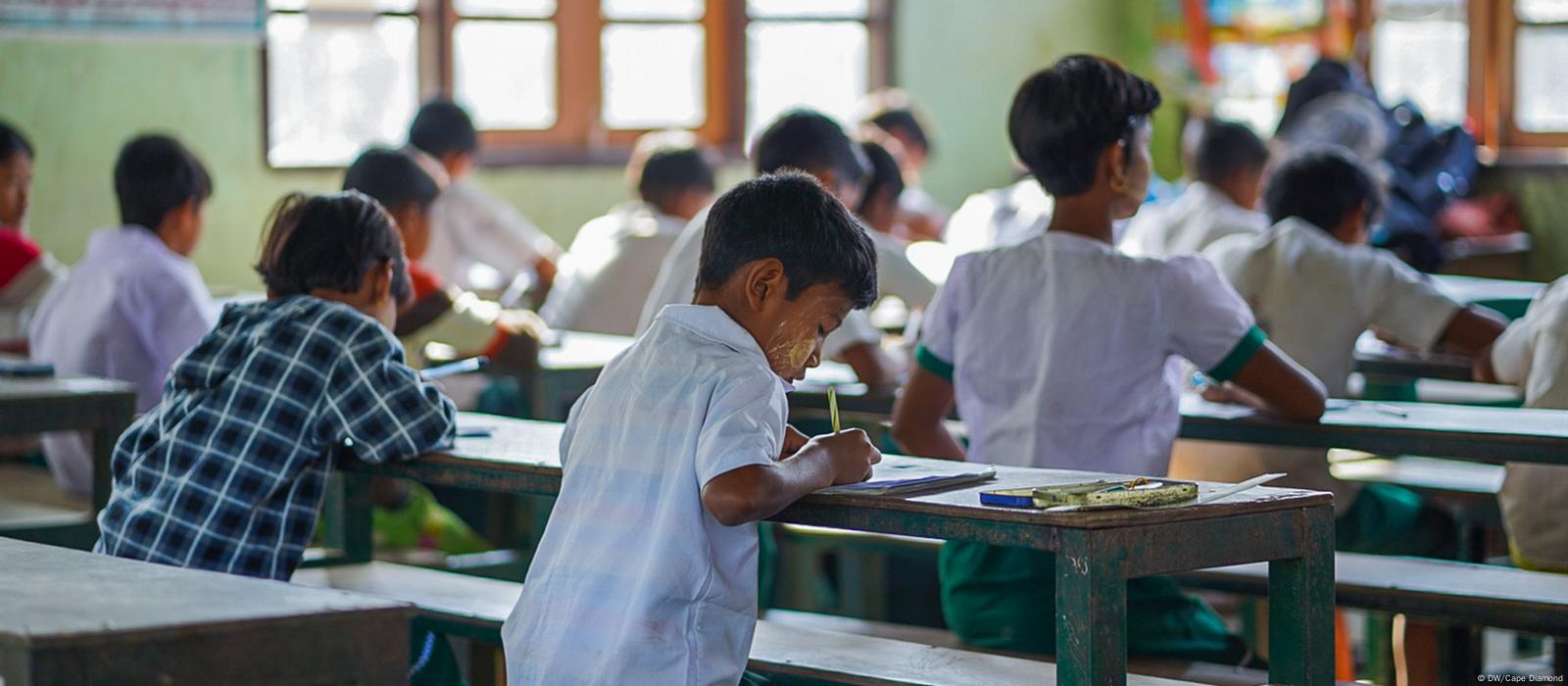
Last year, at least 242 million children in 85 countries experienced disruptions in their education caused by heatwaves, cyclones, flooding, and other severe weather events, according to a new UNICEF report released on Friday.
The United Nations Children’s Fund stated that this equates to one in seven children worldwide missing school at some point in 2024 due to climate-related disasters.
The report highlighted that some countries faced widespread destruction of schools, with low-income nations in Asia and sub-Saharan Africa particularly affected.
However, extreme weather events were not limited to these regions. In Italy, torrential rains and floods at the end of the year forced over 900,000 children to miss school, while catastrophic flooding in Spain interrupted classes for thousands of students.
In addition to southern Europe, Asia and Africa experienced severe flooding and cyclones, but heatwaves were identified as “the predominant climate hazard” impacting schools last year, with 2024 marking the hottest year on record.
In April alone, over 118 million children had their schooling disrupted, as vast areas of the Middle East and Asia, from Gaza to the Philippines, were hit by prolonged heatwaves, with temperatures exceeding 40°C (104°F).
“Children are more vulnerable to the impacts of weather-related crises, including stronger and more frequent heatwaves, storms, droughts, and flooding,” said UNICEF executive director Catherine Russell. “Children’s bodies heat up faster, sweat less efficiently, and cool down more slowly than adults. They cannot concentrate in classrooms that offer no relief from the heat, and they cannot reach school if paths are flooded or if schools have been destroyed.”
Approximately 74% of the affected children were in middle- and low-income countries, underscoring the disproportionate impact of climate extremes on the world’s poorest nations. In April, flooding wiped out over 400 schools in Pakistan, while Afghanistan saw a combination of heatwaves and severe flooding that destroyed more than 110 schools in May.
In southern Africa, drought conditions worsened by the El Niño phenomenon posed significant threats to education, further jeopardizing the future of millions of children.
The extreme weather crises show no signs of slowing down. In December, Cyclone Chido devastated the French territory of Mayotte in the Indian Ocean, leaving children out of school for six weeks. The region was then hit by Tropical Storm Dikeledi in January. Cyclone Chido also destroyed over 330 schools and three regional education offices in Mozambique, where access to education is already a major challenge.
UNICEF stated that the world’s education systems are “largely ill-equipped” to handle the effects of extreme weather.
As per News










amoxil pills – amoxil online buy how to buy amoxicillin
order amoxil online – cost amoxil purchase amoxicillin without prescription
forcan over the counter – flucoan generic diflucan 100mg
buy diflucan 100mg sale – fluconazole 100mg for sale purchase fluconazole online cheap
cenforce cheap – site how to get cenforce without a prescription
cenforce 50mg price – https://cenforcers.com/# buy cenforce 100mg pill
purchase generic cialis – https://ciltadgn.com/ cialis for sale online in canada
buy cialis online overnight shipping – https://strongtadafl.com/ prescription for cialis
cialis where to buy in las vegas nv – strong tadafl cialis reviews photos
buy ranitidine 300mg without prescription – https://aranitidine.com/# ranitidine for sale online
buy viagra cheap line – discount viagra for sale where to buy viagra in canada
cheap viagra next day – on this site buy viagra online cheap
More posts like this would make the online play more useful. https://buyfastonl.com/furosemide.html
With thanks. Loads of knowledge! this
More articles like this would make the blogosphere richer. click
The thoroughness in this break down is noteworthy. https://buyfastonl.com/amoxicillin.html
This is a topic which is in to my callousness… Many thanks! Exactly where can I lay one’s hands on the contact details an eye to questions? https://ursxdol.com/propecia-tablets-online/
The reconditeness in this ruined is exceptional. https://ursxdol.com/augmentin-amoxiclav-pill/
With thanks. Loads of erudition! https://prohnrg.com/product/diltiazem-online/
With thanks. Loads of erudition! https://prohnrg.com/product/atenolol-50-mg-online/
More text pieces like this would make the web better. https://aranitidine.com/fr/acheter-cialis-5mg/
This is the amicable of serenity I enjoy reading. https://ondactone.com/spironolactone/
More posts like this would bring about the blogosphere more useful. https://ondactone.com/product/domperidone/
I am in truth happy to gleam at this blog posts which consists of tons of of use facts, thanks representing providing such data.
celebrex for sale
I am in fact enchant‚e ‘ to coup d’oeil at this blog posts which consists of tons of of use facts, thanks towards providing such data.
how to buy cozaar
This is the amicable of serenity I have reading. http://fulloyuntr.10tl.net/member.php?action=profile&uid=3135
More articles like this would frame the blogosphere richer. http://bbs.yongrenqianyou.com/home.php?mod=space&uid=4272498&do=profile
forxiga pills – https://janozin.com/ order forxiga online cheap
forxiga buy online – https://janozin.com/ forxiga order
buy orlistat without a prescription – https://asacostat.com/# orlistat over the counter
buy orlistat medication – https://asacostat.com/ buy orlistat pills for sale
Thanks recompense sharing. It’s first quality. http://polishcrazyclan.ugu.pl/member.php?action=profile&uid=356924
This is the gentle of criticism I positively appreciate. http://www.cs-tygrysek.ugu.pl/member.php?action=profile&uid=98749
You can conserve yourself and your stock close being heedful when buying prescription online. Some druggist’s websites control legally and put forward convenience, secretiveness, cost savings and safeguards as a replacement for purchasing medicines. buy in TerbinaPharmacy https://terbinafines.com/product/neurontin.html neurontin
You can keep yourself and your ancestors nearby being cautious when buying prescription online. Some pharmaceutics websites manipulate legally and provide convenience, reclusion, rate savings and safeguards over the extent of purchasing medicines. buy in TerbinaPharmacy https://terbinafines.com/product/medrol.html medrol
The vividness in this piece is exceptional. TerbinaPharmacy
More posts like this would make the online time more useful. TerbinaPharmacy
This is the type of enter I unearth helpful.
I couldn’t resist commenting. Profoundly written!